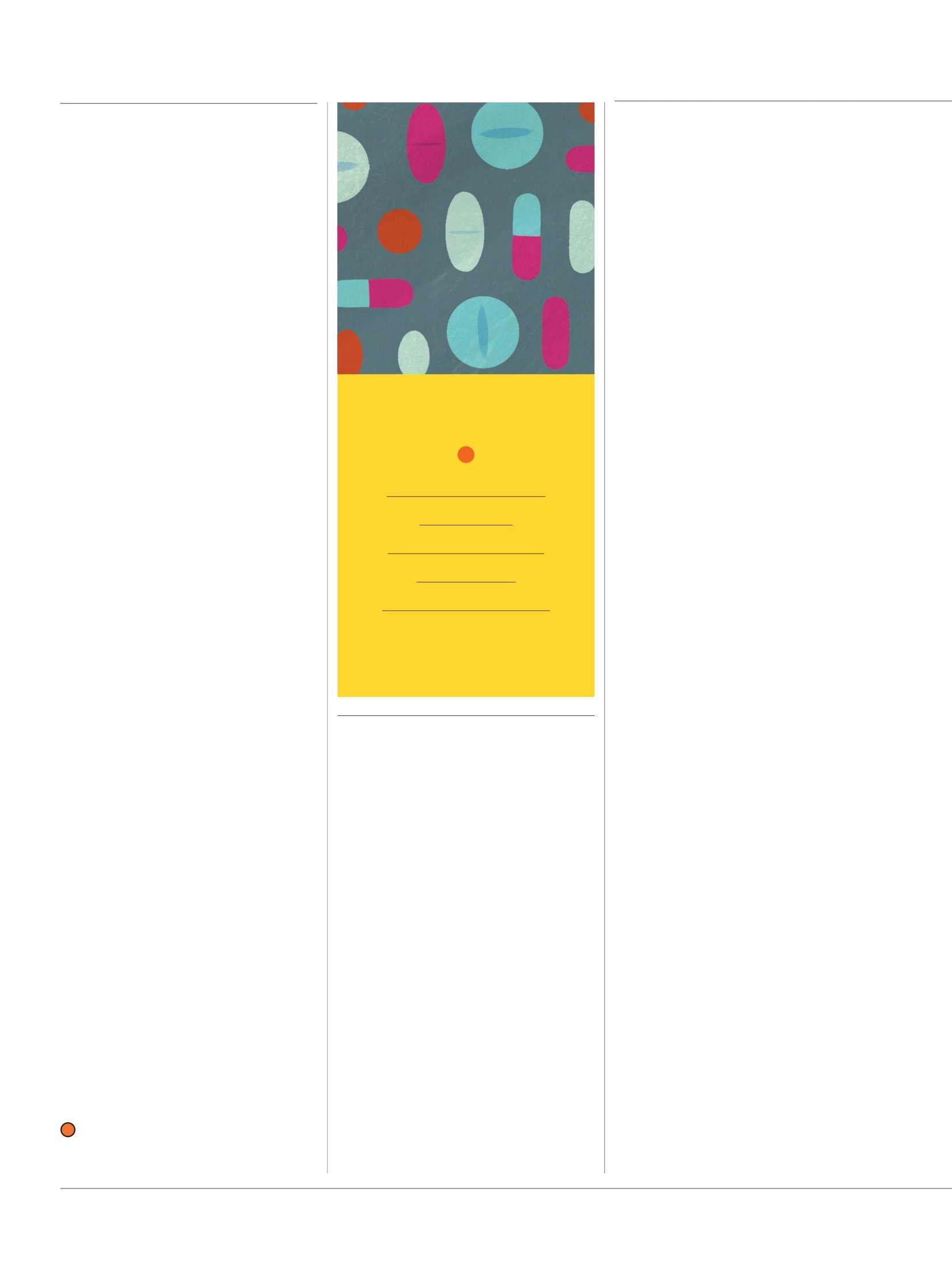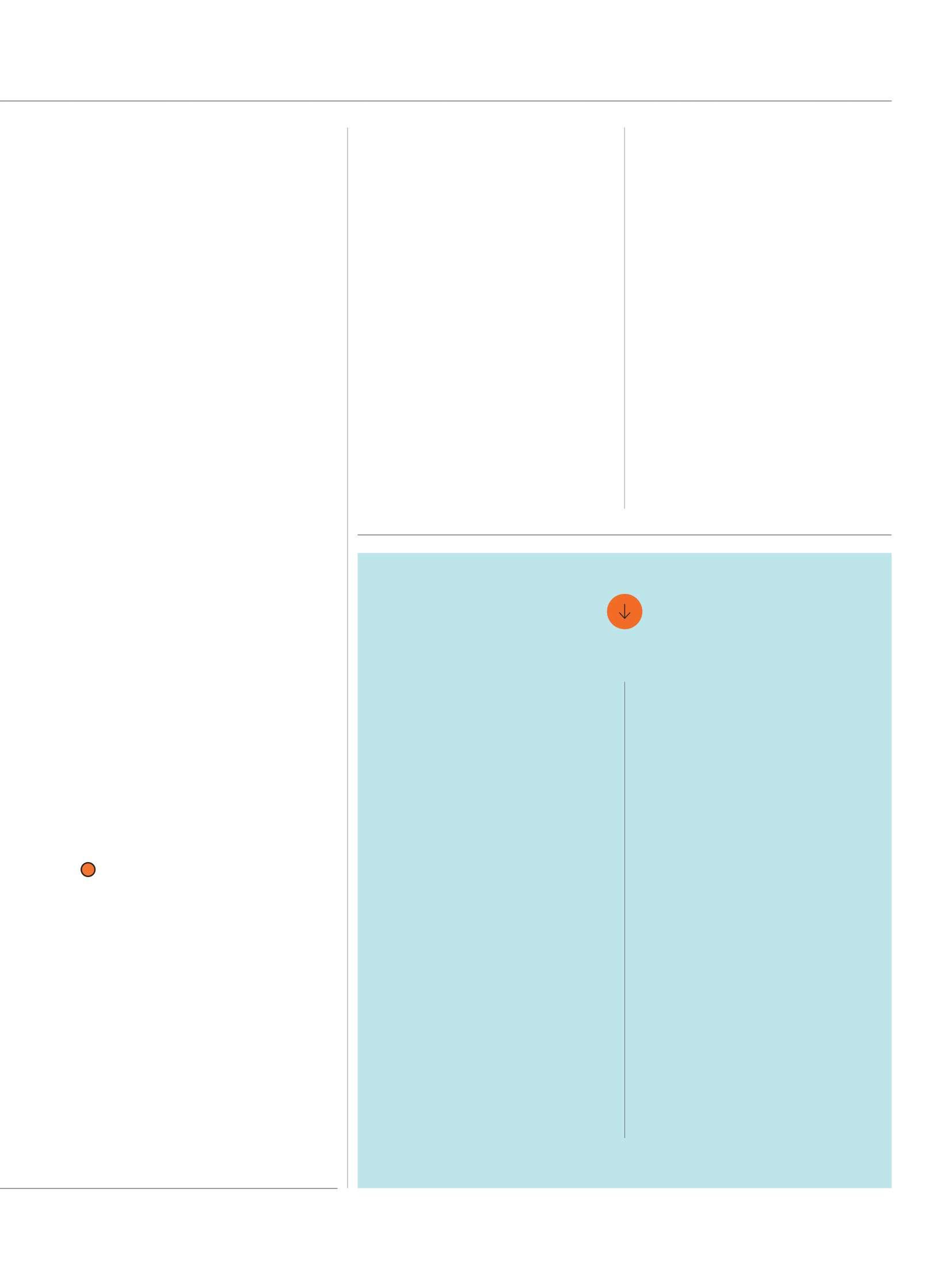
8 minute read
Juggling Your Many Selves
it could be. When I had been psychotic the year before, I wasn’t safe for myself and certainly not for a baby.”
In 2016, Congress passed the 21st Century Cures Act, which established a task force devoted to improving the state of research specific to pregnant and lactating women. Several research centers have set up medication registries. For example, The AmmonPinizzotto Center for Women’s Mental Health at Massachusetts General Hospital runs the National Pregnancy Registry for Psychiatric Medications, which collects data on women who used antidepressants, ADHD medications, and atypical antipsychotics during pregnancy and is currently conducting studies on treatments for postpartum psychosis, a severe form of postpartum depression. These registries help scientists collect data on how drugs may affect pregnancies, which can help inform the safest prescribing guidelines both during and after pregnancy.
Advertisement
Most of the data collected in these registries are what scientists call retrospective—for example, a report from a woman who shares, after she’s had her baby, the medications she used while pregnant and the outcome of her pregnancy. Retrospective studies, however, have their limitations and are not considered the gold standard of drug research. They can’t always control confounding factors that may contribute to the risk that researchers are trying to assess, such as a subject’s depression history, genetics, or smoking and drinking habits. “These factors can blur the results of a study,” notes Dr. Sacks, who hosts the podcast Motherhood Sessions. “ We also don’t necessarily know whether the risks are because of the antidepressant or because of the impact of depression itself.” Gathering new data is an important step toward finding more answers. (The website WomensMentalHealth.org provides information about new research and offers menta l hea lth resources for patients and doctors.)
Weighing the Risks
Suicidal ideation, as Emily, the mom of three, experienced, is one of the
worst-case scenarios of what can happen when a pregnant woman’s mental health condition goes unmanaged. But research shows that a poor mental state can affect pregnancy in other significant ways too.
Louisa, a mom of two boys in Poughkeepsie, New York, who also asked to change her name, manages her depression, anxiety, and bipolar disorder with a combination of Celexa and Latuda, an antipsychotic most often used to treat depressive episodes associated with bipolar disorder and schizophrenia. “I finally felt like a normal person,” she says of starting the medications after years of struggling with “rage spira ls.” “My work, my relationships, everything got better. It was the first time I could remember not feeling so angry and anxious a ll of the time.”
When Louisa and her husband decided to start trying to get pregnant, her doctor advised her to stay on Celexa. But Louisa’s doctor did advise her to wean off Latuda, because there haven’t been adequate and well-controlled studies in pregnant women, and similar drugs have been associated with respiratory distress and other complications in newborns.
Louisa conceived her first pregnancy quickly at age 32 but miscarried at 13 weeks. “My mental state was not good after that,” she recalls. She went back on Latuda to help her cope with the loss and stress of trying again. But when she got pregnant a few months later, she stopped taking Latuda and continued on just Celexa. “Every time, it was a huge conversation,” Louisa says. “I was nervous about even staying on Celexa, but I also knew the dangers of my rage attacks.” Both her boys were born healthy, and she resumed her usua l medication regimen after breastfeeding.
Women with bipolar disorder do have a higher risk for pregnancy complications and birth defects than the general population when taking medication, but discontinuing medication can significantly increase the likelihood of a relapse, according to a 2017 review of 20 studies published in the Journal of Midwifery & Women’s Health. Another study found that women with depression who stopped medication were five times as likely to experience a relapse during pregnancy as women who continued with their prescriptions.
“If you’re suffering from a mood or anxiety disorder or another psychiatric condition, you may need to take medication during pregnancy because the benefits of treatment for you and your baby may outweigh potential relative risks,” Dr. Sacks says. “This is true for psychiatric conditions just as it’s true for medical ones like high blood pressure.” Untreated anxiety or depression can also send high levels of cortisol and adrenaline through the body, which may increase the risk of low birth weight, preterm labor, gestational hypertension, and even miscarriage, explains Jennifer Adaeze Okwerekwu, M.D., a reproductive psychiatrist based in Boston. A baby’s social and emotional
development may suffer as well if their new parent suffers from depression. If a baby coos, for example, and their mom doesn’t have the mental energy to coo back, it can delay the baby’s language development.
Mothers should feel good before, during, and after their pregnancy, says Dr. Okwerekwu. “Children of mentally healthy mothers have better mental, emotional, and behavioral health than those of depressed moms, whether exposed to antidepressants or not.”
As for potential long-term impacts to a child, current accumulated research does not suggest a link between fetal exposure to SSRIs and an enhanced risk for ADHD or autism. “Because mothers’ mental illness can get in the way of the social and communication skills that babies learn from their caregivers, taking an SSRI to get you to a better place may protect these precious opportunities for brain development,” Dr. Okwerekwu points out.
Still, more research is needed to understand the long-term impacts of a range of mental health drugs. Some retrospective research suggests that certain medications, such as Ativan or Xanax, which are antianxiety medications called benzodiazepines, may slightly increase the risk of birth defects like a cleft lip or palate. But early studies suggest that this risk appears to be relatively small—about 0.7 percent—and a more recent study suggests that the risk may be even lower than that number.

Jessica Phillips, 34, of New Orleans, admits she worked hard to manage her generalized anxiety disorder without medication for years before becoming pregnant. “I met with a therapist to learn lots of coping mechanisms and also made changes to my diet and exercise that really helped,” she says. But during the first trimester of her first pregnancy, her anxiety spiked in ways she wasn’t prepared for. “I was terrified to drive on the highway in case I’d get in a car accident, and I woke up every morning afraid I’d lose the baby,” she says. “Pregnancy is supposed to be so joyous, and this was quickly becoming the worst time in my life.” She saw her obstetrician at 13 weeks and explained how she felt, expecting to be told to try harder with her diet or sleep habits. “Instead, she looked at me and said, ‘You know, it doesn’t have to be this way. You could enjoy this pregnancy,’ ” says Phillips, whose doctor then recommended the use of an antianxiety medication.
Her doctor explained that having high anxiety during pregnancy is a risk factor for postpartum anxiety and depression. In one study, Turkish researchers followed 73 women with depression during and after pregnancy and found that those who treated their depression during pregnancy did not report postpartum depression. However, 92 percent of the untreated women continued to struggle in the months after their baby was born.
“It’s a false paradigm to say you can separate the needs of mother and baby,” Dr. Sacks says. “We need to prioritize the mother’s health for her sake in order to ensure a healthy pregnancy.” Phillips agrees: “My doctor told me, ‘This isn’t something you can manage by yourself, and if we don’t treat you, it will affect how you bond with your baby and your memories of this time.’ ” Phillips, who since the time of the interview has had a second child and was medicated during that pregnancy and postpartum, says a combination of medication and therapeutic coping strategies greatly reduced her symptoms. “I enjoyed these pregnancies. And it’s because I felt in control of how we managed my mental health during them.”
I m p r ov i n g H e a l t h (a n d t h e S c i e n c e)
“ T H E B E S T W AY to have a healthy baby is to stay healthy yourself—and that may involve taking a medication,” says Dr. Anne Drapkin Lyerly, of The University of North Carolina at Chapel Hill. If you use medication to manage a chronic mental health condition, women’s health experts recommend talking with all of your doctors (your ob-gyn in partnership with your psychiatrist) about whether to taper your dose or change medications before becoming pregnant. “Switching medications can cause relapses or flare-ups, and ideally you want your symptoms well managed before you get pregnant,” explains Sonja Rasmussen, M.D., a clinical geneticist at the University of Florida, in Gainesville.
But if you become pregnant unexpectedly or develop worsening symptoms while pregnant, you should have an in-depth conversation with your provider about potential risks of your medication and weigh that with the risks of no treatment. If your provider is unsure, ask for a referral to a reproductive psychiatrist or a maternal fetal-medicine specialist, who may be available for a virtual consultation. You can also look up fact sheets on the safety of specific drugs during pregnancy at MotherToBaby .org, a website run by the Organization of Teratology Information Specialists.
“However imperfect, the safety research has been expanding, especially on psychiatric medications,” says reproductive psychiatrist Dr. Alexandra Sacks. In 2015, the FDA began requiring drug manufacturers to redo prescription inserts for all drugs (including generic) so that they offer more detailed explanations about the potential risks of a medication during pregnancy and lactation. (These descriptions replaced an earlier labeling system that categorized prescription drugs as A, B, C, D, and X based on available data—usually animal studies—but that critics said didn’t do enough to help women put the risks into context.) Advocates hope that the new labels are helping doctors and patients make more-informed decisions, although they say there is still room for improvement.










